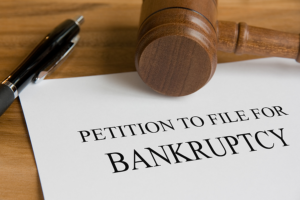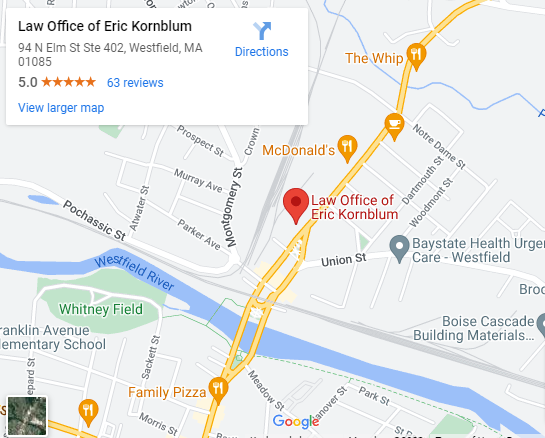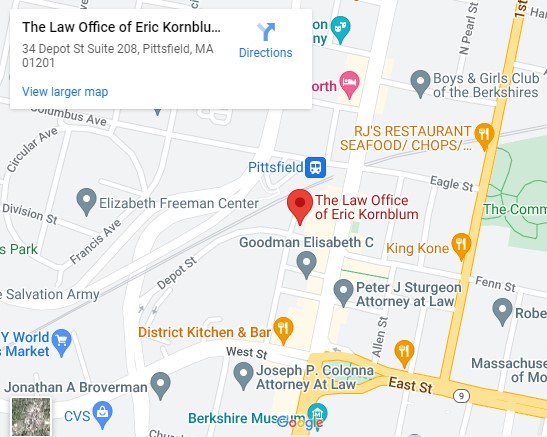Westfield Chapter 7 Bankruptcy Attorney

Chapter 7 bankruptcy helps debtors in financial difficulty who do not have the ability to pay their existing debts. In Chapter 7 cases, we seek to eliminate (discharge) your debts while allowing you to keep your assets. The theory behind Chapter 7 is to give honest debtors a “fresh start.” Our Westfield Chapter 7 bankruptcy attorney is here to help if you want to be free from your debts.
Deciding to file a Chapter 7 bankruptcy is one of the more difficult decisions you can face. With wounded pride, many debtors feel upon filing, the choice is not easy. Learning about the process, however, can help you to make a choice that is best for you. Our Westfield bankruptcy attorney from the Law Office of Eric Kornblum is here to guide you through each step of the way.
If you wish to be free of your debts, schedule a conversation with our Massachusetts bankruptcy law firm today!
Why do I need a Chapter 7 Bankruptcy Attorney in Massachusetts?
We know that people in dire financial situations sometimes may not want to hire a lawyer. After all, that’s another expense on top of the already humongous pile of debt. However, if you decide to skip the attorney, you may lose more than what you would have saved. Making even a single mistake may cause the bankruptcy court to throw out your case. Even worse, they may suspect you of fraud if you fail to fill out the forms properly.
Westfield bankruptcy attorney Eric Kornblum can help make your debts go away. Here’s what you can expect if you retain the services of our trusted bankruptcy lawyer:
- Extensive experience: Eric has spent over 25 years helping Massachusetts residents eliminate their financial worries.
- Intimate knowledge of the bankruptcy code and the legal systems: If you want an efficient and cost-effective bankruptcy procedure, you need someone who knows the ins and outs of the process.
- Aggressive, diligent, and compassionate representation: If you face huge corporations and greedy creditors, you will need a staunch advocate to represent your cause. That’s what Eric provides to those who come to ask for his help.
Eric provides clients with skilled guidance in Chapter 7 bankruptcy proceedings. If you’re ready to end the stress from your debts, schedule a conversation with us today!
What is Chapter 7 Bankruptcy?
Chapter 7 is a liquidation bankruptcy. What happens is that the appointed bankruptcy trustee gathers your assets and sells them to pay off your debts. Afterward, most of your debts will be discharged.
Once you file, you’ll immediately experience bankruptcy protection via an automatic stay. Your creditors can no longer pursue collection actions, like collection calls, lawsuits, or wage garnishment.
If you’re overwhelmed by a medical bill or credit card debt, Chapter 7 offers the fastest way to achieve bankruptcy relief. Ask our Westfield bankruptcy attorney if this is the best option for you!
Start Living Worry-Free Today!
Eric has been helping clients discharge their debts for over 20 years. If you need help with filing bankruptcy, negotiating debts, avoiding foreclosure, and keeping your properties, you’ve come to the right place. Talk to us. We’re ready to listen!
How Does The Chapter 7 Bankruptcy Process Work?
Qualifying for Chapter 7 Bankruptcy
The first step in the Chapter 7 bankruptcy process, assuming you decide you can no longer afford to pay your debts, is to ensure that you qualify for the relief requested. In 2005, the bankruptcy laws changed so that debtors must qualify financially to file for Chapter 7 bankruptcy.
Specifically, you must have a gross income over the previous six-month period before filing bankruptcy at or below the median income of equivalent household size. If you meet those basic requirements, you automatically qualify for Chapter 7 (assuming you haven’t received a bankruptcy discharge in the previous eight years) and can begin the process.
If you do not meet those basic requirements, you must pass “The Means Test.” This test gives you a chance to lower your monthly disposable income by allowing for different necessary expenses, as deemed by the court. Some examples of necessary expenses include:
- Housing and utility costs
- Costs associated with transportation
- Income tax deductions
- Health insurance
- Child care
Let’s say that after including those necessary expenses, your disposable income lowers to a level the court deems acceptable. In that case, you will pass the means test and qualify for Chapter 7 bankruptcy.
Valuing Assets in Bankruptcy
Upon qualifying, the next step is to value your assets. Assets include:
- Homes
- Vehicles
- Furniture
- Electronics
- Jewelry
- Clothing
- Stocks
- Retirement accounts
- Various other items you own
Once you value your assets, you can then claim the allotted exemptions for the assets in order to protect the assets.
Here’s a hypothetical example of this process is: You own a vehicle outright. The vehicle is worth $3,000, and your motor vehicle exemption is $5,000. The motor vehicle exemption protects the asset in this situation, and you will not owe any money to the court.
In another example, your motor vehicle exemption is only $1,000, and as a result, your vehicle is over-exempt by $2,000. In that situation, you would have to either pay the $2,000 to the bankruptcy estate or would have to surrender the vehicle to the bankruptcy estate. Before filing, you must understand the exemption process to ensure that you can protect your assets. While the court allows you to rid yourself of large amounts of debt, you also have an obligation to ensure the creditors receive something from you if you have assets that are not exempt.
Pre-filing Bankruptcy Education
Before filing, the court requires that you take a pre-filing bankruptcy course. In addition, you will have to take a second bankruptcy course after filing in order to receive their discharge.
Bankruptcy Documents
Before filing, you or your attorney will fill out a Chapter 7 bankruptcy petition with all the pertinent information the court will need to process the bankruptcy. Some pertinent information includes your:
- Name
- Social Security number
- Address
- Personal belongings and property
- A full list of all creditors you owe money to
- A breakdown of your income and expenses
- A document called Statement of Financial Affairs, which lists numerous questions related to your finances
Upon completing the petition and the necessary documents, the case can be filed.
Meeting of Creditors
Upon filing, the next step is for the court to schedule a 341 meeting of creditors. The trustee holds this meeting. The court appoints the trustee to represent the interests of the creditors. The meeting takes place around 4-5 weeks after filing at the bankruptcy courthouse. Generally, the meeting is five to ten minutes and consists of questions designed to find assets for seizure and distribution.
It is important to understand some of the hot-button issues that can come up at the meeting, such as:
- Inheritances that have just been received or will be received during Chapter 7 or six months after that
- Any pending lawsuits where you are a plaintiff or a potential lawsuit that you haven’t filed yet
- Any property you sold within two years before filing the bankruptcy
- If, during tax season, there will be questions related to your potential tax refund
Any negative situations associated with the questions previously raised can be resolved or planned around.
Creditor Objections
After the conclusion of the meeting, the Chapter 7 bankruptcy case will stay open for a period of sixty days. The creditor has up until after the sixtieth day to object to the discharge of their debt. All debts, excluding student loans, the majority of taxes, child support, and alimony, are discharged after the last day to object unless the court has reaffirmed the debts. Normally, the only debts allowed to be reaffirmed are mortgages, vehicles, and other secured loans. These agreements must be filed before the discharge to be valid. Otherwise, those debts will also be discharged.
Chapter 7 Bankruptcy Lawyer in Westfield Massachusetts Ready to Help You!
Filing for Chapter 7 is an arduous process that entails thorough preparation. If you properly prepare for this big decision, it could be one of your best financial choices.
The purpose of Chapter 7 is to obtain a discharge of your existing debts. If, however, you committed certain kinds of improper conduct described in the Bankruptcy Code, the court may deny your discharge. Call now to determine if Chapter 7 is right for you!

 MA bankruptcy lawyer Eric Kornblum graduated from State University of New York, Binghamton in 1989 and received his law degree in 1992 at Western New England College, School of Law. Since opening his own practice, Eric has been dedicated to helping his clients resolve their financial problems both in and out of court.
MA bankruptcy lawyer Eric Kornblum graduated from State University of New York, Binghamton in 1989 and received his law degree in 1992 at Western New England College, School of Law. Since opening his own practice, Eric has been dedicated to helping his clients resolve their financial problems both in and out of court. 
